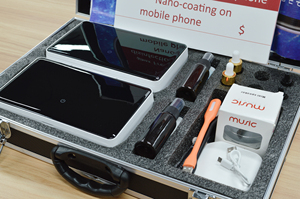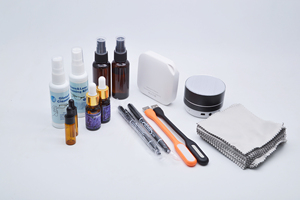
All categories
Featured selections
Trade Assurance
Buyer Central
Help Center
Get the app
Become a supplier

(19528 products available)




















Market Overview: The phone waterproofing machine market is witnessing a notable growth trajectory, fueled by the increasing demand for durable mobile devices. According to Research and Markets, the global market for ultra mobile devices was valued at approximately USD 62.45 billion in 2023 and is projected to reach USD 117.48 billion by 2029, growing at a CAGR of 10.9%. This expansion is closely linked to the rising consumer preference for smartphones that can withstand water exposure, prompting manufacturers to invest in advanced waterproofing technologies. The integration of innovative manufacturing processes, such as nanotechnology and advanced coatings, is enhancing the waterproofing capabilities of mobile devices, making them more appealing to consumers who prioritize durability and functionality.
Industry Insights: As consumer behavior shifts towards outdoor activities and rugged lifestyles, the need for waterproof phones has surged, driving the demand for phone waterproofing machines. Major players in the industry are focusing on enhancing their production capabilities to meet this growing need. Additionally, the popularity of e-commerce platforms has made it easier for manufacturers to distribute phone waterproofing machines globally. With environmental sustainability becoming a critical concern, companies are also exploring eco-friendly materials and processes in their waterproofing solutions. This trend is creating niche markets for sustainable waterproofing technologies, which align with the preferences of environmentally conscious consumers. As the market continues to evolve, strategic partnerships and technological innovations will play a crucial role in shaping its future.
A phone waterproofing machine is a device that applies a water-repellent coating to phones, making them resistant to water damage. There are several different types of phone waterproofing machines, each with unique features and capabilities. Below is an overview of the various types available in the market:
Vacuum coating machine
This machine uses a vacuum to eliminate air before waterproofing. It helps the coating material stick well to the phone surface. It is suitable for coating thin films, and polymers, and for gene transfer. It is also used in solar cells and LED lights. The vacuum makes the coating even and precise. It is good for delicate items that need careful handling.
CNC coating machine
This waterproofing machine for mobile phones utilizes a computer-controlled system to ensure precise and consistent coating applications. It is suitable for waterproofing multiple phones at once, providing high efficiency and uniform coating quality. It is used for gene transfer, solar cells, and LEDs, among other things. The CNC control allows for precise coating thickness adjustments, making it suitable for various coatings.
Spray coating machine
A spray coating machine applies the waterproof coating by spraying it onto the phone's surface. It is suitable for irregular or complex-shaped objects. The coating is applied uniformly and can reach all surfaces. It is also used in solar cells, LEDs, and other applications. The adjustable spray pressure allows for control over the coating thickness and uniformity.
Electrostatic coating machine
This type of phone waterproofing machine utilizes electrostatic forces to attract the coating material to the phone. It ensures even coverage and reduces overspray, making it efficient and environmentally friendly. It has applications in solar cells, LEDs, and more. It is suitable for coating complex shapes and hard-to-reach areas.
Robotic coating machine
A robotic coating machine uses robotic arms to apply the waterproof coating. It provides flexibility and adaptability for different coating processes. It is ideal for coating complex shapes and hard-to-reach areas. It is also used in solar cells, LEDs, and other applications. The robotic system allows for precise control of the coating process, improving consistency and reducing waste.
Vacuum Sealing
This design relies heavily on the vacuum part of the machine. It uses a strong vacuum to suck out all the air inside the phone case that needs sealing. After that, the machine seals the phone case tight so no air or outside stuff can get in or out. This type of waterproofing machine works well for big batches of phones because it is quick and precise. The sealed cases last a long time without letting anything in or out.
Spray Coating
This design sprays a waterproof substance onto the surface of the phone. The machine sprays a fine mist of coating material onto the phone until it is completely covered. This coating forms a waterproof barrier that keeps water and moisture away from the inside parts of the phone. This kind of phone waterproofing machine is good for different kinds of phones since the coating material sticks to all surfaces. It is also a fast way to waterproof phones in large numbers.
Dip Coating
In this design, the machine puts the whole phone into a waterproof liquid. The phone is suspended in the liquid for a short time until it is covered by the coating. This coating then sticks to everything. This method works well for small objects like phones because the entire phone gets coated evenly no matter what shape it is. Dip coating is also a quick way to waterproof many phones at once.
Pressure Treatment
Some waterproofing machines use pressure to get coatings or sealants into cracks and split parts of the phone. The machine puts the phone under high pressure so sealants can fill in any gaps and create a waterproof seal. This design works well for phones that have tiny cracks that other methods can't reach. Using pressure to force sealants into gaps makes for an extra secure waterproof seal on all parts of the phone.
Ultrasonic Cleaning
This design uses ultrasonic waves to clean the phone before waterproofing it. The waves create tiny bubbles in the liquid cleaning solution. When the bubbles burst, they dislodge dirt from the phone's surface. This cleaning makes sure the phone is completely free of dust before sealing it up. An ultrasonically cleaned phone will have no particles between it and the waterproof seal, so the seal sticks better. This method works well for delicate items that need a thorough but gentle cleaning.
Smartphone manufacturers:
These manufacturers are the primary customers for phone waterproofing machines. They need to apply waterproof coatings during the production of phones. So, they need a machine that can add waterproofing coating swiftly and reliably. The machine must work continuously on an assembly line. It may be helpful to have a machine that can apply different coatings to different phone models in one run.
Wearable tech manufacturers:
Companies that make waterproof smartwatches, fitness trackers, and other wearable devices also need phone waterproofing machines. These devices are small, but many users want them to be water-resistant. This is especially true for devices used in swimming and other water activities. Wearable tech manufacturers need phone waterproofing machines that can coat small products precisely. The coating should not add much to the product's size or weight.
Repair shops and refurbish centers:
As more customers want to keep their phones for longer, the refurbishment market is growing. Refurbished phones are a popular choice for environmentally conscious consumers. Repair shops and refurbishing centers that serve this market can use phone waterproofing machines. These machines can re-coat older phone models with worn-out waterproofing coatings. The refurbishing centers can add water resistance to the phones. Adding waterproofing is a big selling point for refurbished phones.
Military and industrial equipment manufacturers:
Industrial and military-grade phones need to withstand more extreme conditions than civilian phones. These phones often face dust, moisture, and splashes in the field. Manufacturers of these phones need to use phone waterproofing machines. They can use the machines to apply thick, durable coatings. These coatings must hold up in harsh environments. The machines may need to coat phones quickly in small batches. Phones made for military and industrial use have different waterproofing needs than consumer models.
Research institutions:
Some research institutions are studying new waterproofing technologies. They are looking into coatings like nanotechnology-based solutions. These institutions may need phone waterproofing machines to test their coatings. They can use the machines to apply experimental coatings to smartphones. Then, they can evaluate how well these coatings improve water resistance.
Technology Used
It is important to know what kind of technologies the machine uses. Check if the machine uses a vacuum or mist coating technology. Machines with vacuum technology can make the waterproof coating last for a long time and provide a thorough coverage. However, machines with mist coating technology are more suitable for applying many different coatings.
Production Capacity
The production capacity of the phone waterproofing machine should also be considered before making a purchase. This can be determined by how fast the machine can complete the waterproofing process for one phone. It can also be evaluated by how many phones the machine can waterproof in one hour. It is essential to choose a machine that can meet a business's production demand within a reasonable amount of time.
Application Versatility
When choosing a phone waterproofing machine, the versatility of the applications should be considered. It should be able to apply various types of coatings to different parts of the phone. This includes being able to coat the screen, battery, camera, and so on. When a machine is versatile, it is easier for manufacturers to customize their applications based on the specific needs of their production lines.
Ease of Use
Another important factor to consider is the ease of use of the phone waterproofing machine. A machine that is not user-friendly is difficult for operators to use. This can result in many operational errors and, as a result, decrease the quality and consistency of the coatings. It is also important to choose a machine that has an intuitive interface and easy controls for both manual and automatic operations.
Machine Size and Footprint
The size and footprint of the machine should also be considered, especially if the production space is limited. Make sure that the machine can fit into the production space without any inconveniences. If not, it may not be the right machine for the job. In addition, make sure to consider the layout of the production line when selecting a machine so that it does not obstruct the movement of workers or materials.
Safety Features
One should never underestimate the importance of the safety features of the machine. It is important to choose machines that have good safety features to ensure the health and safety of the operators. Look for machines that are equipped with emergency stops, protective enclosures, and so on. This will minimize the risk of accidents and injuries in the workplace.
Cost Considerations
Last but not least, the cost of the phone waterproofing machine should also be considered. When selecting a machine, it is important to ensure that it fits within the budget without compromising on quality. However, one should also remember that the cheapest option is not necessarily the best. It is important to find a machine that balances cost and performance.
Q1: How can a waterproof coating machine enhance the durability of phone cases?
A1: By creating an extra layer of protection that keeps water out and defends against potential damage caused by wet conditions.
Q2: What benefits can a phone waterproofing machine bring to case manufacturers?
A2: It enables them to offer a value-added feature, expand their market reach, and reduce the likelihood of product returns due to water damage.
Q3: Who are the primary customers for waterproofed phone cases?
A3: Individuals in professions with high exposure to water, adventure enthusiasts, and anyone living in areas prone to rainy weather.
Q4: What is the environmental impact of using a phone waterproofing machine?
A4: The machine uses chemicals that can be harmful to the environment; therefore, recycling and proper disposal are necessary.
Q5: How long does it take to waterproof a phone case using this machine?
A5: The process is usually quick, often taking just a few minutes per case, depending on the technology used.